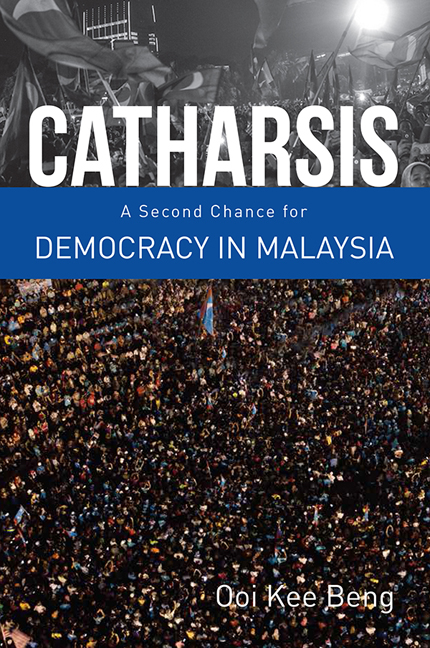Book contents
- Frontmatter
- Contents
- Foreword
- 1 Introduction – Malaysia's Future Is Redeemed
- Before Pakatan Harapan
- 2 After All These Years, Malaysia Is Still Held Hostage
- 3 Beyond the Nationalism Trap
- 4 Federating Malaysia — A Continuous and Troubled Process
- 5 Funeral for a True Son of Penang
- 6 Let's Work Out What Malaysia Is Good For
- 7 The Unity Fetish
- 8 When the National Narrative Loses the Script
- 9 Let's Be Cosmopolitan and Leave Multi-ethnicity Behind
- 10 Noses Don't Grow Back
- 11 Mahathir's Bersatu is Best Understood as an NGO
- Before 9 May 2018
- With Mahathir at the Helm
- Beyond 9 May 2018
- About the Author
11 - Mahathir's Bersatu is Best Understood as an NGO
from Before Pakatan Harapan
Published online by Cambridge University Press: 12 February 2019
- Frontmatter
- Contents
- Foreword
- 1 Introduction – Malaysia's Future Is Redeemed
- Before Pakatan Harapan
- 2 After All These Years, Malaysia Is Still Held Hostage
- 3 Beyond the Nationalism Trap
- 4 Federating Malaysia — A Continuous and Troubled Process
- 5 Funeral for a True Son of Penang
- 6 Let's Work Out What Malaysia Is Good For
- 7 The Unity Fetish
- 8 When the National Narrative Loses the Script
- 9 Let's Be Cosmopolitan and Leave Multi-ethnicity Behind
- 10 Noses Don't Grow Back
- 11 Mahathir's Bersatu is Best Understood as an NGO
- Before 9 May 2018
- With Mahathir at the Helm
- Beyond 9 May 2018
- About the Author
Summary
The recent decision by the 91-year-old former Malaysian Prime Minister Mahathir Mohamad and his closest supporters to form a new political party understandably raised many eyebrows. This incomprehension turned into indignation when it was announced that the party, Parti Pribumi Bersatu Malaysia (Bersatu), will be a Malaybased one and non-Malays can only be associate members.
The pertinent question the founding of Bersatu appears to raise is whether racial affinity is really something one can ignore in politics be it in Malaysia or elsewhere. And if yes, to what extent. However, the issue is another.
The opposition parties had been growing stronger over the last decade but never strong enough, and with that, it has become clear that Barisan Nasional, the ruling coalition, remains in power because it has the rural vote. Even with the scandals surrounding 1MDB, Prime Minister Najib Razak's government appears unassailable still.
The claim that Malaysians are moving away from race politics is undeniably truer of urban areas than of the kampongs. Is the hold that UMNO has in the rural areas exercised through patronage politics alone, as multiracialists would like to believe, or is it more profoundly because UMNO is seen by many Malays as the champion of their race, no matter how bad its recent performance has been?
Bersatu is essentially not in effect to be seen as an ordinary political party. It is best understood as a one-issue non-government organisation (NGO). And its goal is the toppling of Najib. In the context of its founding, it could not have been anything other than a race-based party and its simple strategy is to win votes away from UMNO and convince rural voters that there can be more than one Malay champion.
In that sense, Bersatu has a progressive role to play.
- Type
- Chapter
- Information
- CatharsisA Second Chance for Democracy in Malaysia, pp. 37 - 38Publisher: ISEAS–Yusof Ishak InstitutePrint publication year: 2018

